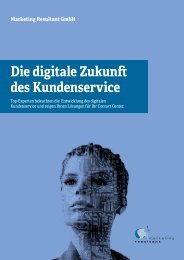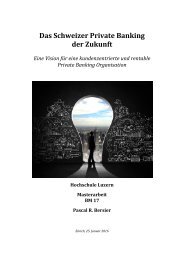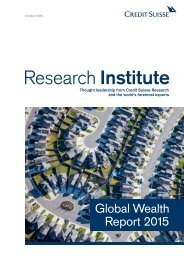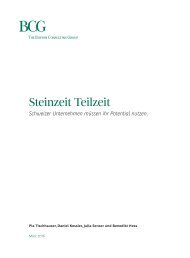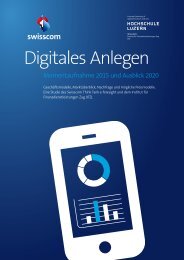Technology
tax14-technology-abo-version-lowres-151020
tax14-technology-abo-version-lowres-151020
Create successful ePaper yourself
Turn your PDF publications into a flip-book with our unique Google optimized e-Paper software.
<strong>Technology</strong><br />
Some companies express the view that<br />
the tax authorities’ digitization drive is due<br />
to the new transparency and disclosure<br />
requirements. In their opinion, this leads to<br />
such an increase in the administrative<br />
burden that companies are essentially<br />
performing some of the functions of a tax<br />
administration. How would you respond<br />
to that view?<br />
Generally speaking, information on the<br />
life and activities of a company is already<br />
contained in taxpayers’ accounting<br />
systems in a structured, electronic form.<br />
It is simply a matter of enabling that<br />
information to be presented to the tax<br />
administration on a systematic basis and<br />
by automated means. It is not information<br />
that would otherwise be hidden from the<br />
tax authorities. We can access the<br />
information by conducting tax audits,<br />
but that really would represent an<br />
additional administrative burden on the<br />
businesses concerned. It is certainly<br />
true of any new system that certain initial<br />
costs are faced. However, those costs<br />
decrease significantly within a short time,<br />
and the development of a risk-oriented<br />
approach means that audits are fewer<br />
and better targeted, which ultimately<br />
leads to a reduction of the administrative<br />
burden on business.<br />
How is information on changes<br />
communicated to taxpayers? How hard,<br />
or how easy, is it for taxpayers to adapt<br />
to changes in the system?<br />
The main tools are the official<br />
website of the Federal Tax Service and<br />
the mass media. Our portal is one of the<br />
highest rated among Russian government<br />
websites, and we make every effort<br />
to ensure that taxpayers experience a<br />
minimum of difficulty in adapting to<br />
changes in the area of tax administration.<br />
Our updated site contains all necessary<br />
information, presented in simple and<br />
accessible language, about new<br />
developments in tax law, current tax<br />
rates and reliefs, the availability of online<br />
services, and so on. As an example<br />
of our efforts, the site developers have<br />
tried to ensure that any information<br />
can be found within three clicks.<br />
Electronic services are an important<br />
component of the site. Russian residents —<br />
individuals and legal entities — are now<br />
obliged to submit notifications of controlled<br />
Russia<br />
7<br />
time zones<br />
This gives an idea of the colossal scale<br />
of the Federal Tax Service. Over 2,000 tax<br />
offices serve taxpayers across those<br />
zones. The number of individuals registered<br />
with the Russian tax authorities is around<br />
140 million. The number of organizations is<br />
around 4.4 million. And the number of<br />
private entrepreneurs is around 3.6 million.<br />
Every day, 321,000 people contact<br />
the tax authorities. Those people are served<br />
by 150,000 tax officials.<br />
For more, see:<br />
nalog.ru/eng/1.html<br />
foreign companies (CFCs). How much<br />
time will it take for your Service to possess<br />
full information? How might this affect<br />
tax collection rates?<br />
Under the new CFC rules, from<br />
2015 taxpayers are obliged to disclose<br />
information on their ownership<br />
interests in foreign organizations and<br />
unincorporated foreign structures<br />
(where certain conditions are met).<br />
From 2017 taxpayers will be obliged to<br />
submit notifications regarding<br />
organizations and structures which are<br />
classed as controlled foreign companies<br />
and to pay tax on undistributed profits<br />
Mikhail Mishustin<br />
Commissioner of the Russian Federal Tax Service<br />
of such companies. At the same time,<br />
our experience in this field tells us<br />
that exchanging information with foreign<br />
tax administrations is an important<br />
instrument in tackling the issue<br />
of tax avoidance. We are trying to be<br />
transparent in the way we work. I think<br />
that taxpayers are likewise well advised<br />
to embrace transparency, maintain a<br />
constructive relationship with the tax<br />
service and pay their taxes responsibly.<br />
In view of the Service’s participation<br />
in the OECD Forum on Tax Administration,<br />
how important is international and regional<br />
cooperation with the tax administrations<br />
of other countries?<br />
Participation in the Forum is very<br />
important for the Federal Tax Service.<br />
It enables us to provide important input<br />
into the international tax agenda and<br />
learn about international leading<br />
practices in the field of taxation. Another<br />
traditional form of cooperation is the<br />
international exchange of information in<br />
the tax sphere which takes place<br />
on the basis of double taxation treaties.<br />
We also have a fairly broad program of<br />
cooperation in tax matters with our close<br />
neighbors, implemented through the<br />
platforms of the Coordinating Council of<br />
Heads of Tax Services of CIS Countries<br />
and the Expert and Tax Committee<br />
of the Eurasian Economic Commission<br />
within the Eurasian Economic Union.<br />
I might add that the exchange of<br />
information with those countries on<br />
payments of indirect taxes takes<br />
place on an automatic basis. ı<br />
Mikhail Mishustin graduated from the Moscow Machine Tool Institute (1989)<br />
in computer-aided design. He received his PhD in Economics in 1992.<br />
In 1995—96, he was Deputy General Director and Chairman of the<br />
International Computer Club. In 1998, he was made Deputy Head of the<br />
Russian Federal Tax Service. He then held other agency leadership positions<br />
before being appointed as Commissioner of the Federal Tax Service in 2010.<br />
In addition to his responsibilities in the Federal Tax Service, Mishustin is<br />
also vice-chair of the OECD’s Forum on Tax Administration (FTA).<br />
The FTA was created in 2002 and is a unique forum on tax administration<br />
for Commissioners from 46 OECD and non-OECD countries, including<br />
every member of the G20. Mishustin is currently coordinating an FTA project<br />
on the provision of taxpayer e-services.<br />
50 EY – Tax Insights for business leaders №14



